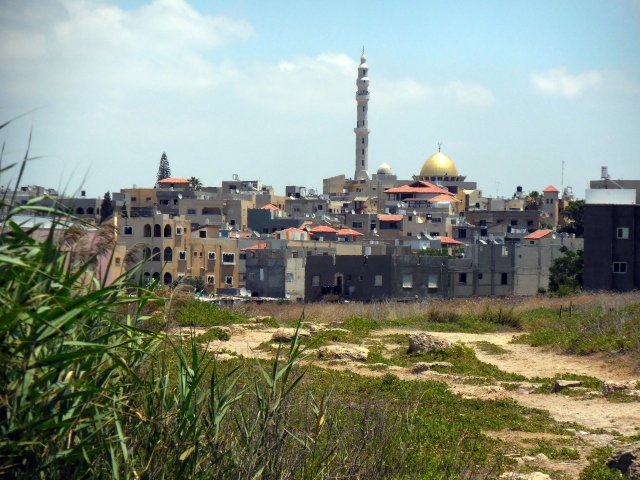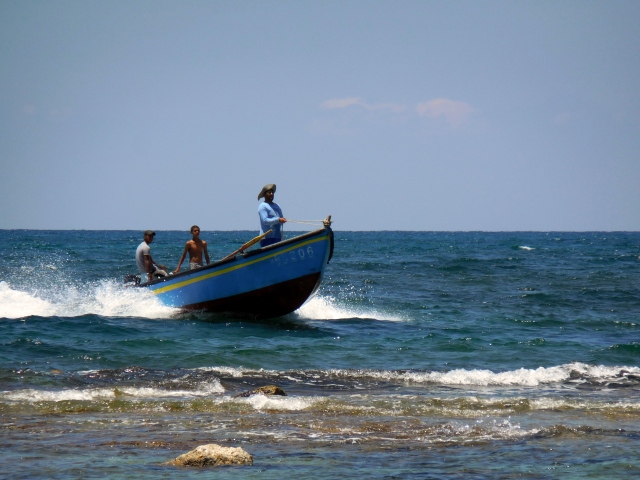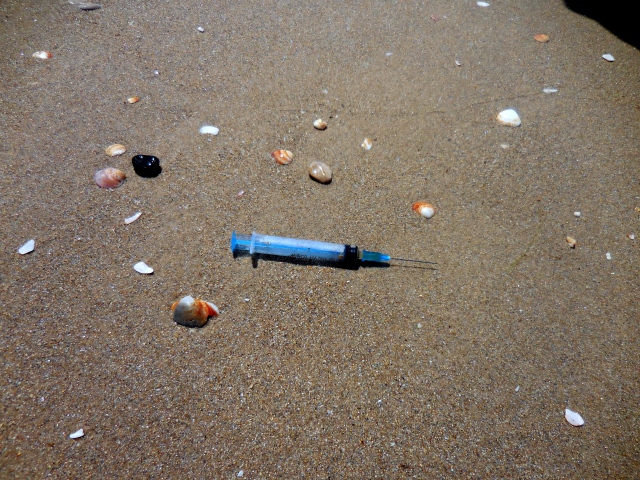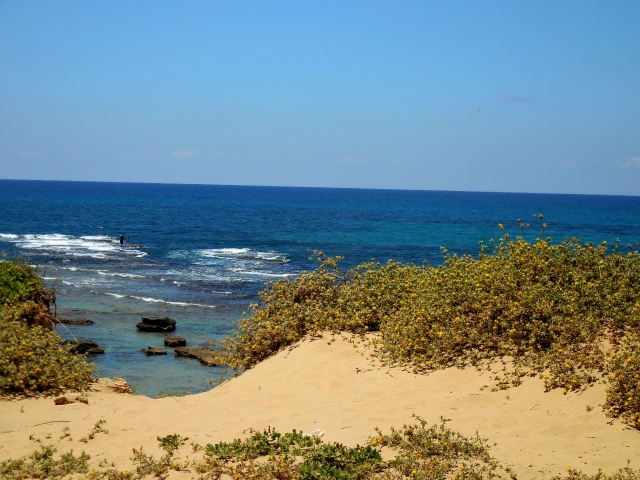Jisr al-Zarga means “bridge over the blue.” A little fisherman village by the Mediterranean Sea in Northern Israel, Jisr sports a fully Arab community of about 15,000 people. The area is stunning, but beyond the perimeters of some photos, bags, bottles, and shoes litter the area.
Being the only seaside, Arab, traditional fisherman village makes this a pretty special place. It feels even more unique as one of the only three Christians in the whole Muslim village. The other two Christians are my mother and sister.
One part of Arab culture that gets old really fast is having to wear clothing to your ankles, even in the hot, summer weather. It is recommended, wrote our hostel, to wear pants when walking around the village- which I do. However, getting to the beach involves walking down one, long stretch of Arab neighborhood. Since I refuse to walk all day on the beach in long pants, I brave the looks of disdain for the love of shorts.
Local fishermen.
Alcohol is a less common sight around here, supposedly not sold many places. My mom didn’t hear this part of the conversation with our guesthouse host and asked for a beer at the falafel restaurant across the street. The guy who served us there is one of the two people who speak a bit of English in Jisr, apart from the guesthouse owners. The guy seemed surprised and has since turned her request for beer into a joke.
Jisr is the poorest city in Israel, with the highest crime rate (within its community), and the highest school dropout rate at 12%. Only 30% of the population contributes taxes, that small percent being the working women of the community. Here, the men sit around and run the few shops to be found and fish. Catching the bus at 5 in the morning, it is the women who go off to work two or three jobs and come home without a place to relax. As our host educated us, women are not allowed in the coffee shops- only men. It is the dream of this Jisr hostel to one day open a coffeehouse in a garden just for women.
Yeah, that’s not safe.
Shortly after our arrival, I saw a little boy of about 10 years old smiling and pointing around a pretty realistic-looking, fake gun. Many loud gunshots also accompanied us to bed, apparently a celebration gesture for an Arab wedding, as we learned the next morning.
Stopping by the falafel restaurant a second time, but this time alone, turned out to be my favorite episode of this Jisr visit. As I waited for my sandwich, I was bade to sit down with the English-speaking, beer joke guy and two other Arab men. One of them turned out to be able to communicate a bit in English. The other guy, more my age, just watched me with a bit of curiosity and perhaps kindness. Once I learned how to ask someone’s name in Arabic, I decided to ask this younger guy his name, since he couldn’t understand much of the rest of the English conversation we were all having. I have no idea what he said his name was. It just sounded Arabic.
Not the beer joke guy, but the other English-competent guy, whose name was also lost on me, early into the conversation jumped up from his seat and went into the restaurant (we were sitting outside.) He returned smiling with paper and a pen. I had asked how one could say a few basic things in Arabic. This guy, whose job was “working with people at a school,” proceeded to teach me Arabic. This is what he wrote:
Hello- Marhaba
Thank you- Shokran
How are you- Kif Halk
See you-bay (bye)/ Ma elslawa
How many shekes (shekels)/ kam elmablag
What you learn/ Mada ttalam
What’s your name/ mada esmak
How old are you/ Kam omrak
Nice to meet you/ ana (I,me,my) saed bemaareftak
I want to eat/ oread an akol
I want to drink/ oread an ashrab
I really got an authentic lesson. When I asked about the “mada” in two different sentences, he taught me that mada means “what” and “kam” means “how” when speaking about thing in numbers, such as money or age. Oread means I want. Ana means I, or me, or sometimes my. He was also very patient helping me to pronounce be-maa-reftak. Saed means happy.
As restricted as women are in the Muslim culture, it felt a bit incredible to sit at a table with Arab men and talk and laugh as friends. That’s what a tourist status can do for you.
Tonight is a Friday night and things are pretty hopping around here. As I was informed by my new Arab friends, this Friday and Saturday are a holiday and no one is working. A few weddings are going on as well. Tomorrow my mom, sister, and I plan on taking a Sabbath rest relaxing on this gorgeous piece of Arab seaside.
Ma elslawa!




